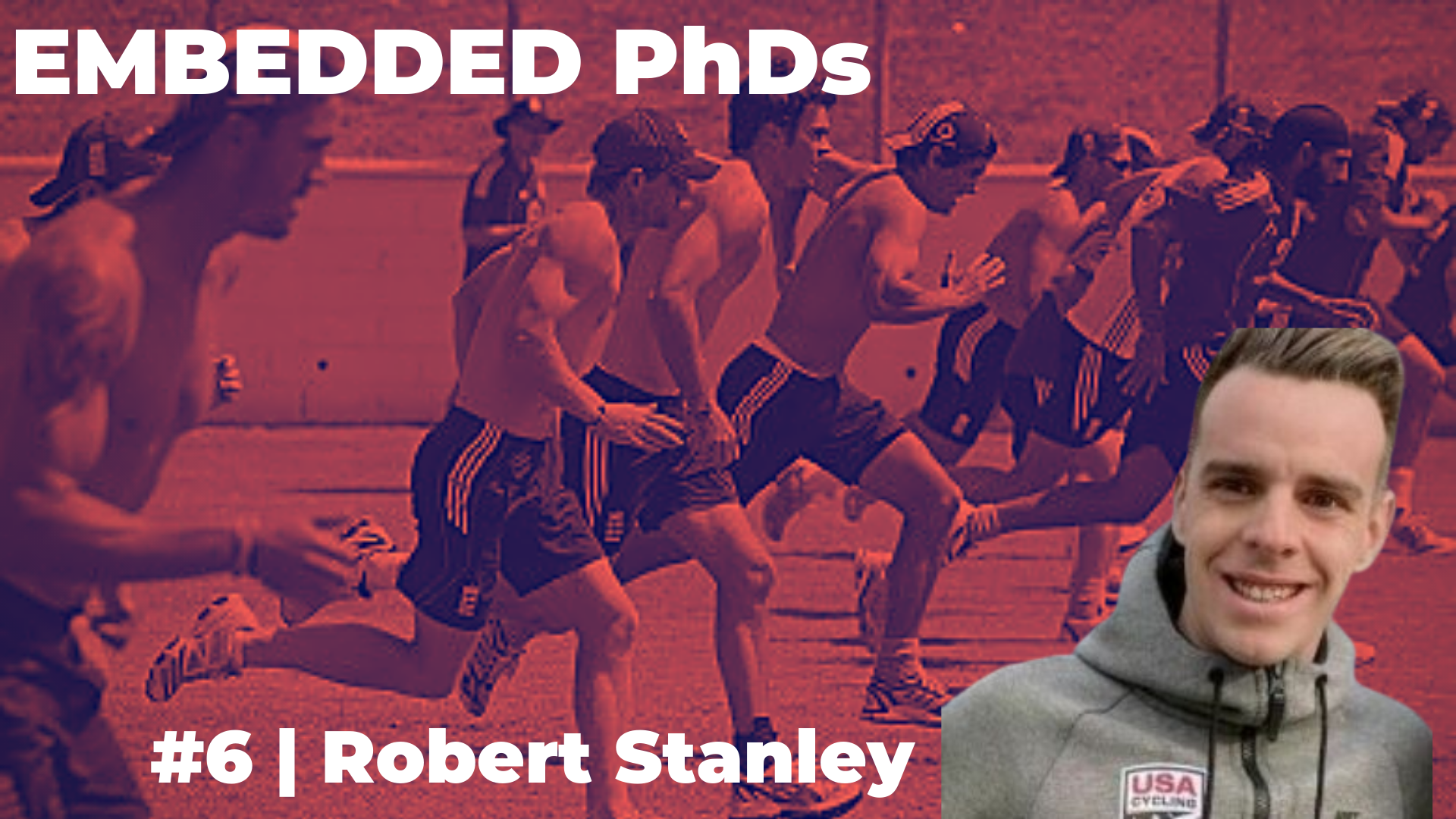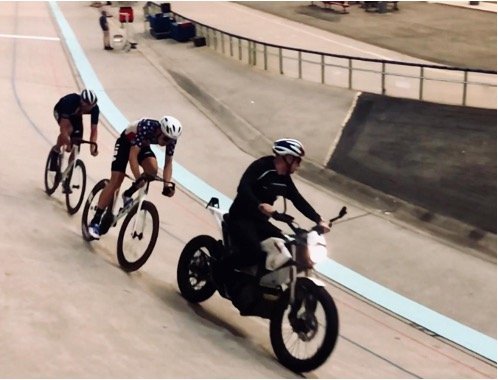Insights from an Embedded PhD: #6 - Robert Stanley
My Background
I am a High-Performance Coach and Scientist working with USA Cycling on the Track Cycling programmes. I have previously worked in a similar role for the Japanese Cycling Federation. Throughout my time working for national teams, I have been studying for my PhD at Leeds Beckett University and hope to finish in early 2022.
My love for anything on two wheels is what continues to drive me to pursue a career in cycling, although I raced a little when I was younger, I was never an amazing athlete, but I knew I wanted to be heavily involved at the pointy end of the sport. I started coaching at the local velodrome shortly after finishing my undergraduate degree, an experience which I feel was invaluable in giving me the foundations to work in high-performance sport. Whilst I now love to ride a range of cycling disciplines, the fast paced and intense nature of track cycling is my biggest passion. My motivation to study for a PhD was predominantly as a tool to get my foot in the door of high-performance sport and develop from local level coaching however I now view my PhD as a way of thinking and a principle methodology that I will carry with me throughout my career as an applied practitioner and researcher.
The PhD?
My PhD is studying the ‘Determinates of Performance in World Class Men’s Track Cycling Omnium Events’. The best way I can describe it is the study of racecraft. I am taking an integrative approach to measure and quantify the physical, tactical and contextual performance demands of the race with a primary goal of being able to help myself and other coaches better understand the race and how we might approach preparing athletes for world class performance. By being really focussed in the subject area, I can be quite broad in exploring multidisciplinary ways to understand performance. I particularly enjoy this as it enables me to use my work to bring together a range of different perspectives, I feel this allows me to really engage with a range of high-performance practitioners in a wholistic way that better serves the athletes I am working with. The specificity of my studies really helped me to land a practitioner role in the first place, I would highly recommend taking time to research and find out what questions that existing coaches want to answer if you aspire to work in applied sport during a PhD.
Ultimately, I believe that a PhD (particularly in a science-based subject) gives you a set of critical thinking and analysing skills that you can then apply to your work as a high-performance practitioner almost irrespective of the topic area. When defining my job role at USA Cycling, I told my boss that I wanted to be front line and coaching, but I also want to be involved in behind-the-scenes research and development projects to which he responded ‘a coach with science is just a better coach’ which I think sums it up quite well. Doing my PhD alongside working in a world class environment as afforded me the opportunity to learn and develop a wide set of skills and I now feel confident in leading on projects in almost any area of performance even if it is not my ‘forte’.
The Job
We are currently undergoing a significant re-structure which means on a day-to-day basis all our job roles are quite fluid as we must adapt and learn to make sure we still support the athletes in a world class manner. Some of my favourite parts of the job are coaching sessions on the velodrome, video analysis and feedback sessions with the athletes, aero-testing and optimisation, writing training plans, motor-pacing on the velodrome (any excuse to ride a bike) and working with other coaches and practitioners to build and refine our high-performance systems and environments. However, some tasks can be less exciting, even in the perceived glamourous world of world class sport, we still have administration to do!
My role started predominantly in science projects that would deliver ideas and information to the coaches who would then choose what to use or not use to deliver to the athletes. More recently, however I have transitioned back into a coaching role whereby I am able to deliver directly to the athletes. Whilst it is very tempting to directly utilise some of the insight I have gained from my PhD studies to coach athletes, the timing and manner in which a practitioner communicates with athletes is critical, ‘here is everything I know about your race’ is not a particularly effective coaching technique. Despite this, some of the athletes appear to appreciate that I have an academic skillset and I feel this earns me some buy in and trust that is critical to my effectiveness as a coach.
Similarities
I have learned to view my PhD as though I am an athlete training. Sometimes the priority is just consistently turning up, doing some work every single day allows you to maintain the skills and thought trails that you develop, it is easy to forget about the PhD when you have been supporting the athletes in training or competition all day. Sometimes you must really focus on quality over quantity, I have been guilty of being naïve to the amount of time it can take to write up results and make sure they are communicated in the way I intended. Other times you may perceive that you have gone backwards, especially when you submit a paper or chapter to your supervisors, and they seemingly rip it apart. Just like an athlete breaking down their muscle in preparation to super compensate and come back stronger, it is important to follow this process as part of the research journey too, learning from each piece of feedback you receive.
Differences
It startled me when I first started in Japan how far apart the worlds of research and applied sport are on so many levels but there were two main things that stuck out. Firstly, the speed at which your counterparts want answers. Coaches often want instant answers, but you should not let this be a reason to provide opinions without having done due diligence on where those answers come from which is something my supervisors encourage me to do on much longer time frames than would be acceptable in the applied world. Secondly, the relative difference in understanding and complexity of models utilised. I have come to understand that both in research and the applied world, practitioners can be guilty of overcomplicating things that are simple and oversimplifying things that are more complex however this probably happens more in the applied world where there is a tendency for some practitioners to only take away broad headlines and concepts as they may not have as much time to get stuck into the nuts and bolts of research. This is where I have found that as a practitioner with both academic and applied backgrounds, I can really help in being a filter for other practitioners and athletes. My rule of thumb is, if I or another practitioner cannot explain something in a single sentence then it is not well enough understood for us to be utilising but equally unless something can be validated and measured reliably (this does not necessarily mean there has to be a paper on it, sometimes you must do your own validation) then we should not be utilising it either.
The Future
In summer 2021 I attended the Olympic Games with Team USA where we walked away with a gold medal in the Women’s Omnium and a bronze medal in the Women’s Team Pursuit. I am now looking forwards to Paris 2024, specifically working towards maximising qualification and medal potential for our men’s track endurance team as well as competing in other major competitions such as World Championships and Pan American Games along the way. Although my role has developed into becoming the lead coach for the men’s team, I am keen to keep my hand in research and science projects that will not only bolster the team’s knowledge and ability to provide world class coaching, but it will also help us to develop the next generation of practitioners to sustain our successes into the future. To do this, I am building a relationship between us (USA Cycling) and the high-performance centre at the University of Colorado Springs which will allow us to mutually benefit from research, professional development and the sharing of resource.
Key Messages
Your research is a methodology, not a final answer, be careful what, how and when you share ‘results’, particularly with athletes.
Listen and learn from as many other practitioners as you can but develop your own philosophies and stay true to your methods of filtering which knowledge is useful and which is not.
If you cannot simplify it into a single sentence, don’t expect anyone else to understand.
How to contact me
Twitter: @robert_stnly
LinkedIn: https://www.linkedin.com/in/robert-stanley-785645a8/
If you liked this blog post - or at least learnt something - and would like to collaborate, please drop me an email using the contact form. I’m trying to collect as many interviews as I can!




